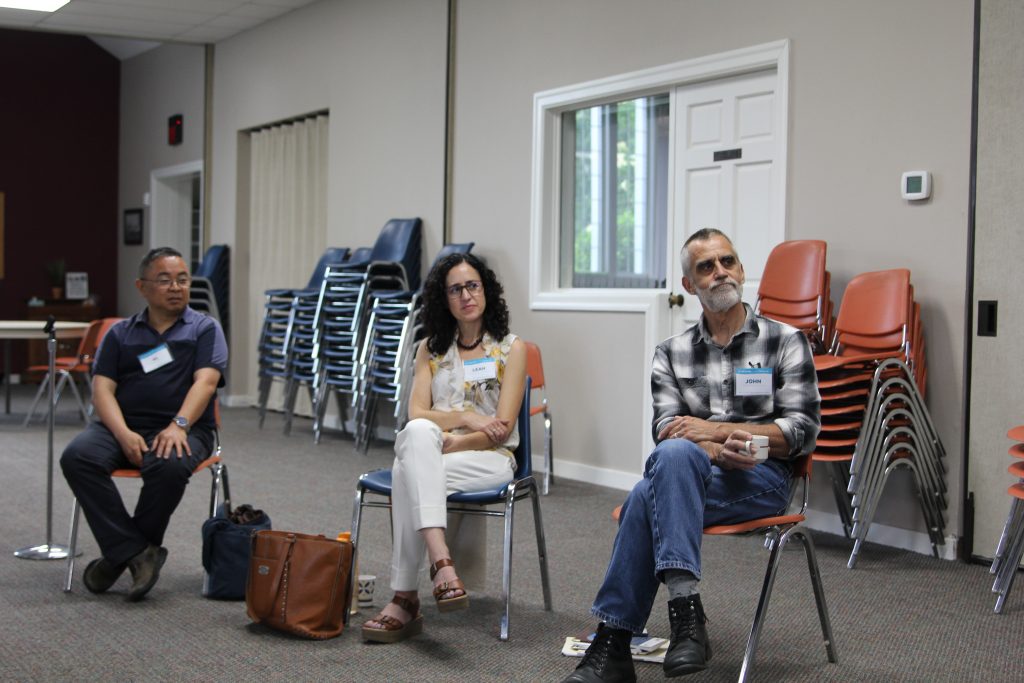No one has been immune to the COVID-19 pandemic. While some may have experienced great loss, all of us—including church leaders—have experienced some sort of trauma during the past 15 months.
To learn about healing processes for this trauma, twenty-five Mosaic Conference pastors and leaders gathered on June 11-12, 2021 for a hybrid workshop at Swamp (Quakertown, PA) Mennonite Church and via Zoom. Three experts in the field of trauma and trauma healing—therapist John Drescher-Lehman, LCSW; Dr. Leah Thomas, professor of pastoral care at Anabaptist Mennonite Biblical Seminary; and global peacebuilder Dr. Al Fuertes—shared their collective wisdom.

Trauma results in a loss of connection, therefore the need to re-connect is critically important; we cannot just re-connect and ignore the trauma, however. Throughout the weekend, participants were reminded that healing from trauma happens best in community. In this unique time of trauma healing, when everyone has been affected by the pandemic, it is important to remember that leaders need to recover from our own trauma while also holding space for others to recover.
“The light God lit in us does not go out, even when we struggle with pain.”
When trauma occurs, it is very normal to either avoid and abandon or become hyper-focused on the emotional, spiritual, social, sexual, physical, or intellectual parts of our lives. During the opening session, candles were lit for each of these areas, and participants were invited to light their own candle from these flames, honoring the effect trauma has played in their lives during the pandemic. Drescher-Lehman reminded us, “The light God lit in us does not go out, even when we struggle with pain.”
Throughout the weekend, presenters reminded participants that if trauma is not addressed and honored, re-traumatization is likely to occur. As leaders, we want to ensure that our own trauma, and our collective trauma as a congregation, is processed in healthy ways, preventing further traumatization.
Thomas shared three keys for post-trauma healing: Calm, Connection, and Communication. We can create calm together through practices like communal prayer, singing, silence, appropriate touch, and familiar rituals/liturgies. To build connection, we want to work on authentic relationships with each other. In fostering communication, we want to be clear, kind, and transparent, setting boundaries, and being authentic and intentional. We also want to offer people choice, giving permission for them to participate or not, especially when recovering from trauma. Through all of these steps, it is important that we are compassionate with ourselves and each other.
The healing of trauma is also shaped by the intersection of a person’s culture and life experiences. In some ways, trauma is universal and there are core symptoms (avoidance, irritability, sleep issues) that happen to all persons who experience trauma. Culture can also greatly impact trauma, however, in how we describe it, how we present and process emotions, how we understand suffering and healing, and how a person makes meaning or heals from the trauma. Even within shared cultures, individuals can respond very differently to trauma, as their experience of trauma is shaped by their sense of self, personality, resilience, theology, and personal and/or familial history. As church leaders, it is important to pay attention to the three aspects (universal, cultural, and individual) of pastoral care to persons processing and healing from trauma.
“As I participated in the COVID healing workshop via zoom, one of the presenters asked us to find a place and a position that made us feel comfortable, whether sitting or lying on a couch. I closed my eyes and followed his instructions of breathing and visualization. I inhaled and exhaled and became more relaxed. I envisioned a bright day with a panoramic view of a big, green, grassy field. There was a rabbit and a dark image of a bird (probably representing me) on the left-hand side looking into the grassland.
As I processed this time, I realized I had been staying at home for over a year, not even going out grocery shopping. The visualization exercise encouraged me to go outside again, to heal in God’s creation of nature.”
– Wendy, workshop participant
One way that participants were guided to process the trauma of COVID-19 was through somatic spiritual exercises, such as breathing exercises and gentle yoga. “The body can tell us when we are in danger and unsafe, but the body can also tell us when we are safe and grounded,” explained Dr. Leah Thomas. As a result, paying specific attention to our physical bodies can help us identify areas in our lives that may need attention and healing.
As we move into the next phase of pandemic life, it is important to honor and acknowledge how each of us as individuals and as congregations survived. Taking time to honor the unique journey, giving time to grieve, and express gratitude for making it through, will all aid to post-pandemic healing and resiliency.
The opinions expressed in articles posted on Mosaic’s website are those of the author and may not reflect the official policy of Mosaic Conference. Mosaic is a large conference, crossing ethnicities, geographies, generations, theologies, and politics. Each person can only speak for themselves; no one can represent “the conference.” May God give us the grace to hear what the Spirit is speaking to us through people with whom we disagree and the humility and courage to love one another even when those disagreements can’t be bridged.
